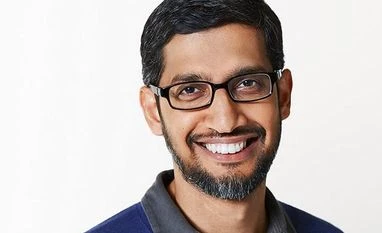Artificial Intelligence (AI) chatbots like ChatGPT and Bard are expected to make software programming easier and more accessible to people, Sundar Pichai, chief executive officer (CEO) of Alphabet and Google said.
In a podcast with the New York Times (NYT), Pichai said that AI chatbots would do some of the "grunt" work, making programming more fun.
"I think for software engineers, there are two things that will also be true. One is some of the grunt work you're doing as part of programming is going to get better. So maybe it'll be more fun to programme over time — no different from Google Docs, making it easier to write. And so if you're a programmer, over time, having these collaborative IDs with the assistance built in, I think, is going to make it easier," he said.
Lately, there has been widespread tension and anxiety among professionals that AI-based chatbots might soon take over their jobs. ChatGPT has showcased the ability to write articles, review codes and even create images based on text inputs.
Pichai said that society would have to adapt to the new technology. "I think this one, there'll be a lot of societal adaptation. And as part of that, we all may need to course-correct in certain areas," he said.
He also raised concerns that the development of AI is currently moving too fast and "perhaps poses a threat to society".
Pichai added that the company will release more capable models of its chatbot Bard soon.
"We clearly have more capable models. Pretty soon, we will be upgrading Bard to some of our more capable Pathways Language Model (PaLM) models, which will bring more capabilities; be it in reasoning, coding, it can answer maths questions better," he said.
Bard was released to the public on March 21 but failed to garner the attention won by OpenAI's ChatGPT and Microsoft's Bing chatbot.
Pichai said that part of the reason for Bard's limited capabilities was a sense of caution within Google.
"To me, it was important to not put out a more capable model before we can fully make sure we can handle it well," he was quoted as saying in the report.
Pichai confirmed he was talking with Google co-founders Larry Page and Sergey Brin about the work.
(With agency inputs)
In a podcast with the New York Times (NYT), Pichai said that AI chatbots would do some of the "grunt" work, making programming more fun.
"I think for software engineers, there are two things that will also be true. One is some of the grunt work you're doing as part of programming is going to get better. So maybe it'll be more fun to programme over time — no different from Google Docs, making it easier to write. And so if you're a programmer, over time, having these collaborative IDs with the assistance built in, I think, is going to make it easier," he said.
Lately, there has been widespread tension and anxiety among professionals that AI-based chatbots might soon take over their jobs. ChatGPT has showcased the ability to write articles, review codes and even create images based on text inputs.
Pichai said that society would have to adapt to the new technology. "I think this one, there'll be a lot of societal adaptation. And as part of that, we all may need to course-correct in certain areas," he said.
He also raised concerns that the development of AI is currently moving too fast and "perhaps poses a threat to society".
Pichai added that the company will release more capable models of its chatbot Bard soon.
"We clearly have more capable models. Pretty soon, we will be upgrading Bard to some of our more capable Pathways Language Model (PaLM) models, which will bring more capabilities; be it in reasoning, coding, it can answer maths questions better," he said.
Bard was released to the public on March 21 but failed to garner the attention won by OpenAI's ChatGPT and Microsoft's Bing chatbot.
Pichai said that part of the reason for Bard's limited capabilities was a sense of caution within Google.
"To me, it was important to not put out a more capable model before we can fully make sure we can handle it well," he was quoted as saying in the report.
Pichai confirmed he was talking with Google co-founders Larry Page and Sergey Brin about the work.
(With agency inputs)
)